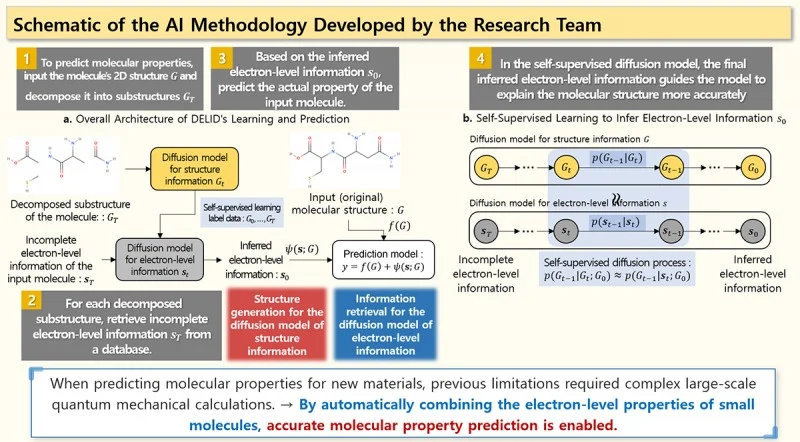By learning electron-level information, Korean researchers have created an artificial intelligence (AI) tool that can anticipate molecular properties without the need for expensive quantum mechanical calculations.

Schematic of the AI Methodology Developed by the Research Team. Image Credit: Korea Research Institute of Chemical Technology (KRICT)
A collaborative research team led by Professor Chanyoung Park from the Korea Advanced Institute of Science and Technology (KAIST) and Senior Researcher Gyoung S. Na from the Korea Research Institute of Chemical Technology (KRICT) has created a novel artificial intelligence (AI) technique called DELID (Decomposition-supervised Electron-Level Information Diffusion) that uses electron-level information to accurately predict material properties without the need for quantum mechanical calculations.
In real-world datasets with around 30,000 experimental molecular data points, the approach produced state-of-the-art prediction accuracy.
Traditional computational science and AI approaches have been hampered in their ability to use electron-level information, essential for identifying molecular properties, due to the high cost of quantum mechanical computations. As a result, most contemporary AI models depend entirely on atom-level molecular descriptors, which reduces prediction accuracy, especially for complex molecules.
To solve this issue, the researchers developed DELID, a generative AI system that infers electron-level characteristics of large molecules by merging information from smaller molecular fragments.
DELID decomposes complex molecules into chemically valid substructures, collects electron-level information from quantum chemistry databases, and employs a self-supervised diffusion model to determine the overall electronic structure. This allows for precise property prediction without the requirement for large-scale quantum mechanical simulations.
DELID is unique in that it enables the prediction of molecular property using electron-level information without requiring the target molecule to undergo quantum calculations. This marks a significant step forward, enabling electron-aware forecasting without relying on quantum computers.
DELID outperformed other state-of-the-art models in benchmark tests on more than 30,000 experimentally observed molecular property datasets, including optical, toxicological, and physical characteristics.
Existing models generally exhibit low prediction accuracy (31–44%), especially for optical property prediction tasks like CH-DC and CH-AC, which are pertinent to OLED and solar cell material design. With an accuracy of 88%, DELID outperformed the best AI models already in use by more than double.
DELID enables accurate prediction of molecular properties by incorporating electron-level information without the burden of high computational cost, overcoming a major limitation of conventional AI approaches.
Gyoung S. Na, Senior Researcher, Korea Research Institute of Chemical Technology
KRICT President Dr. Youngkuk Lee added, “We expect DELID to make significant contributions to practical AI applications in chemical industries such as drug discovery, toxicity assessment, and optoelectronic materials development.”
This research was presented at ICLR 2025, one of the premier AI conferences.